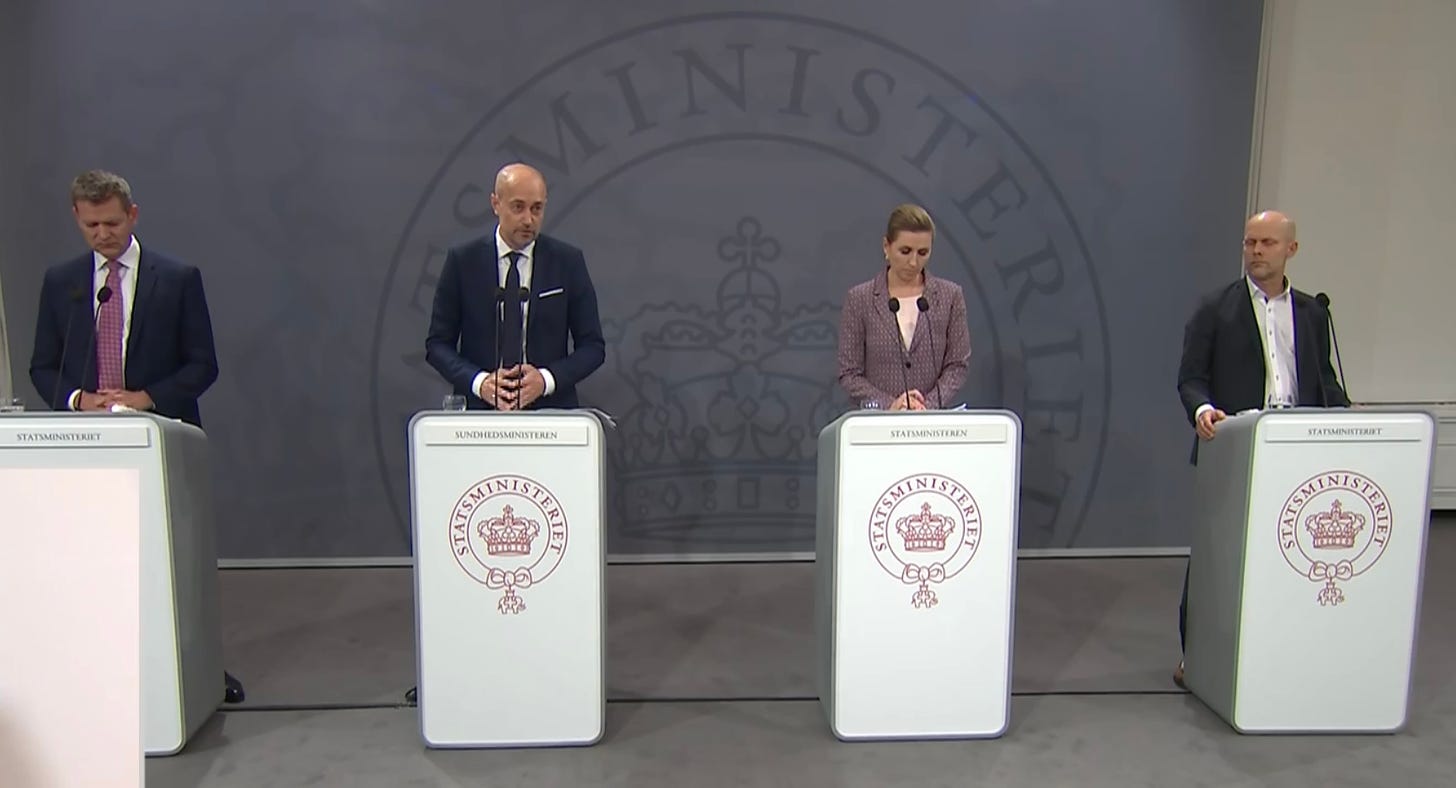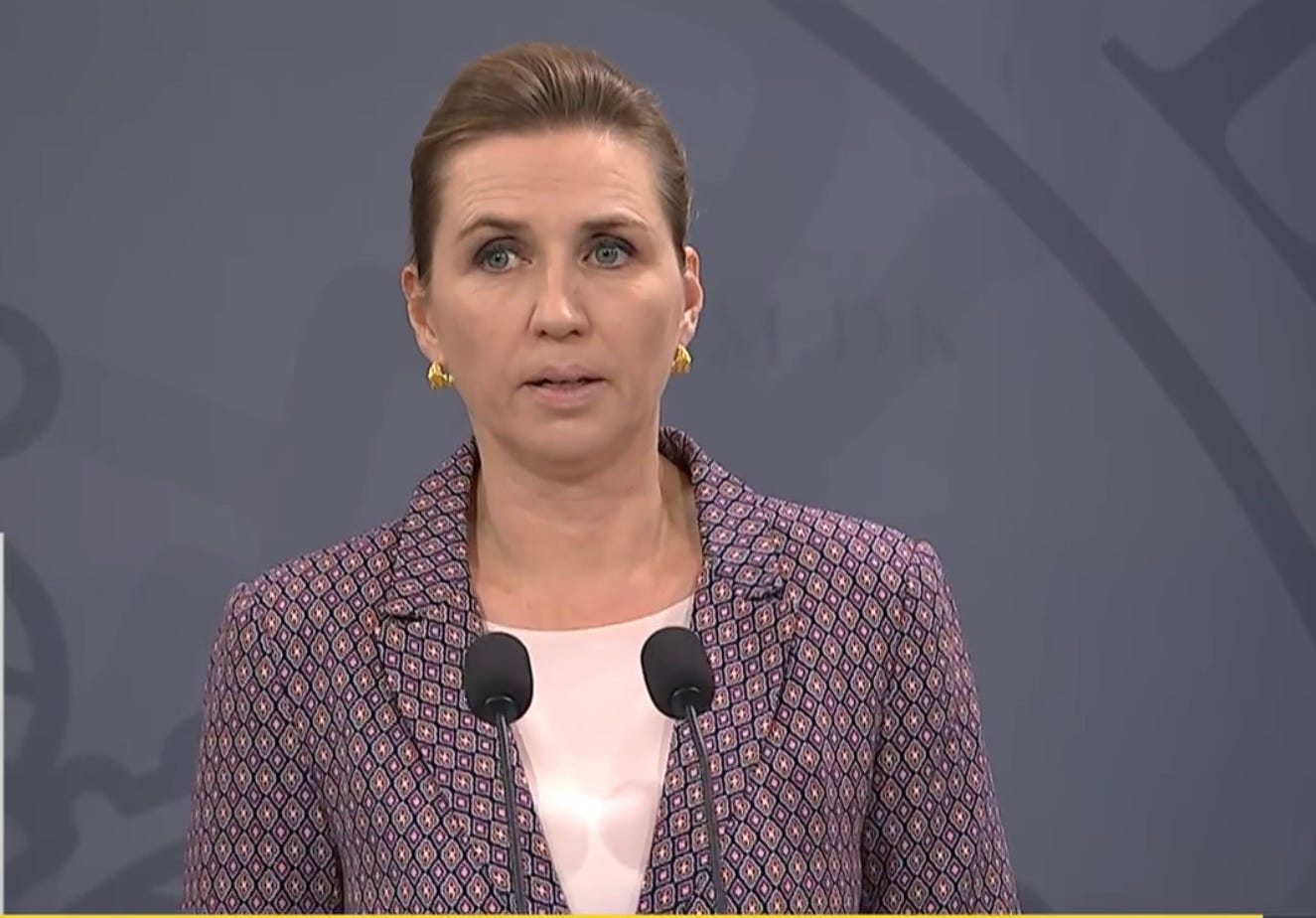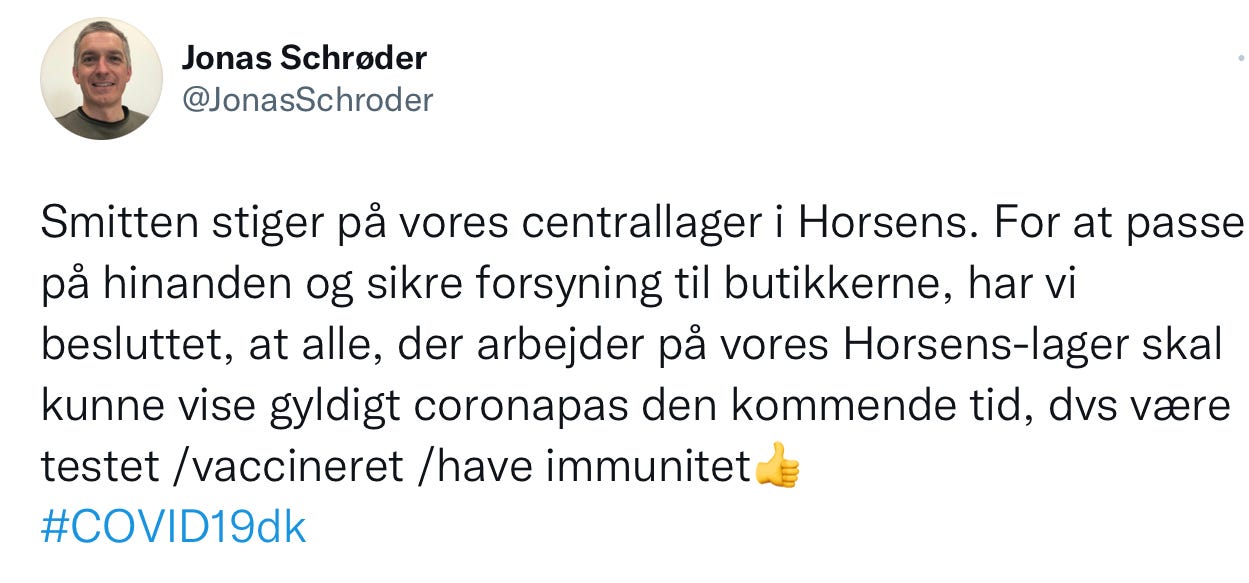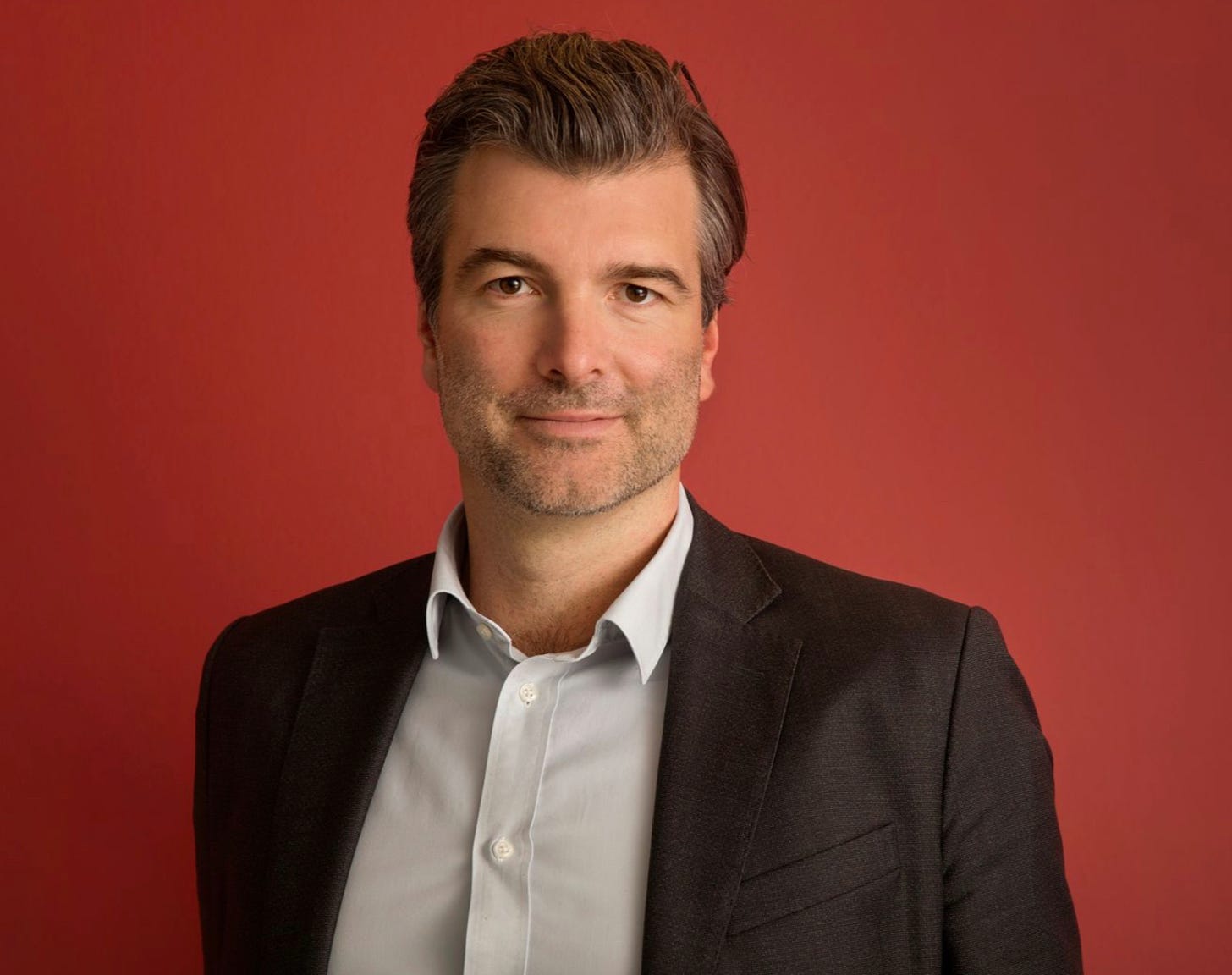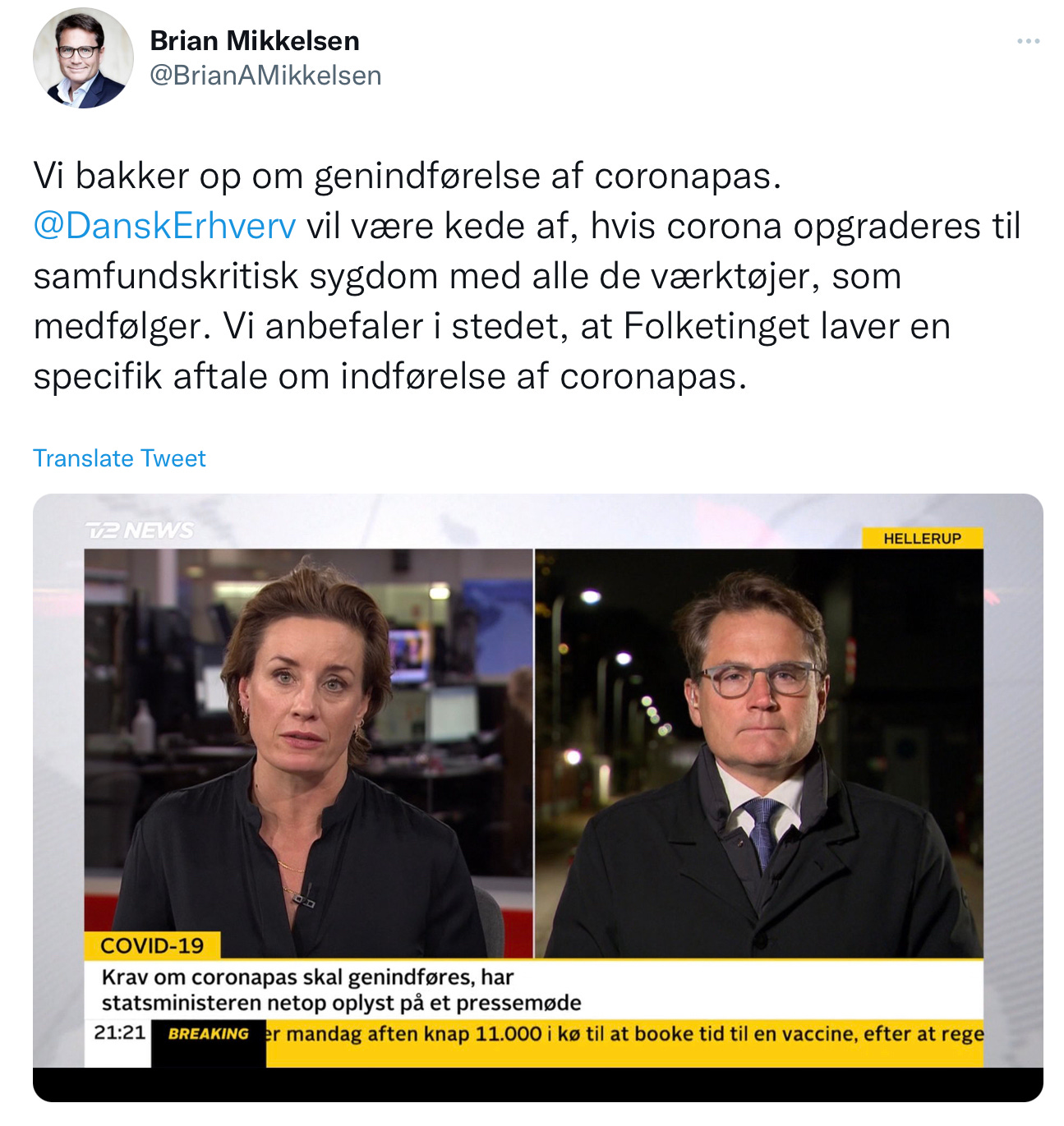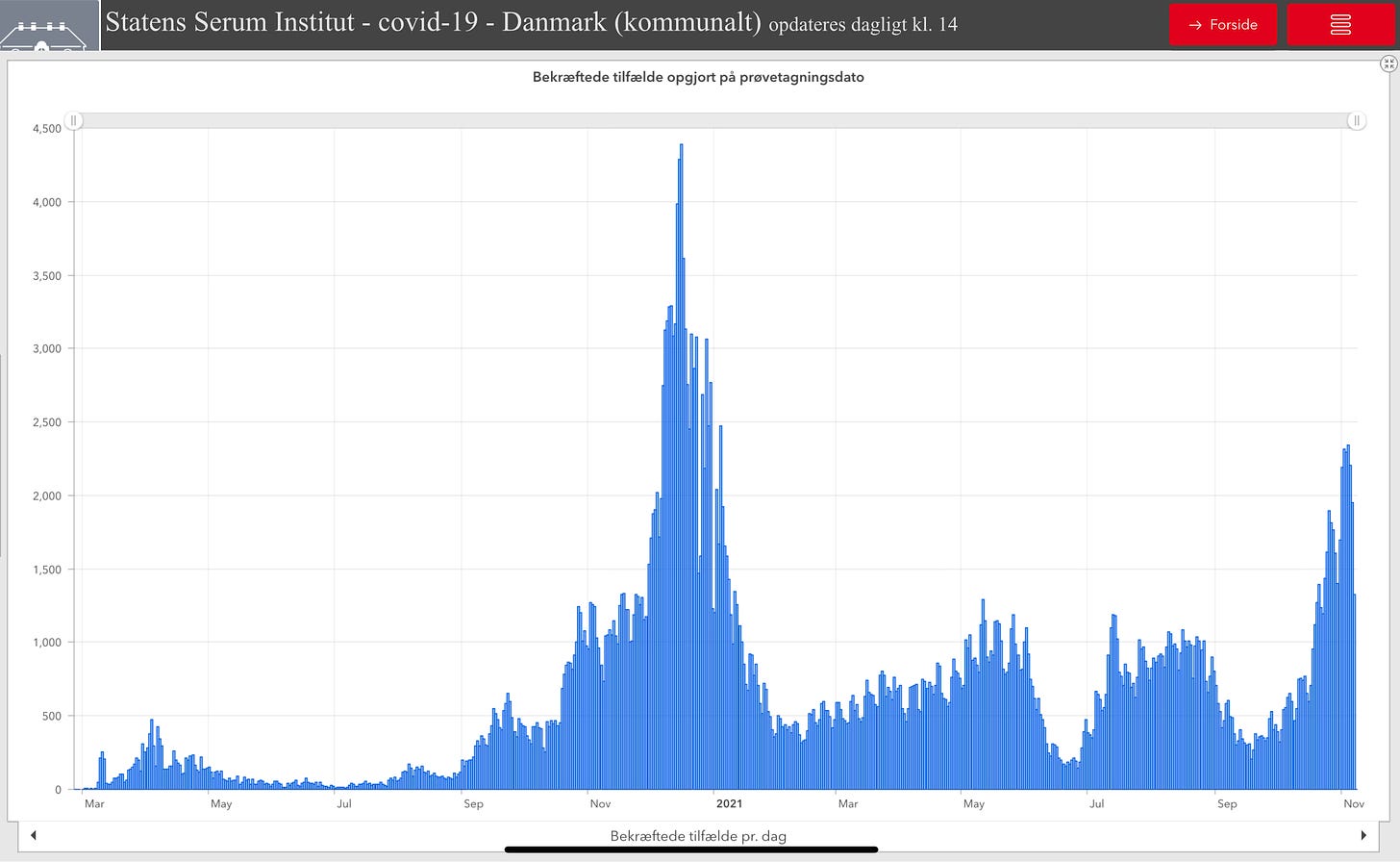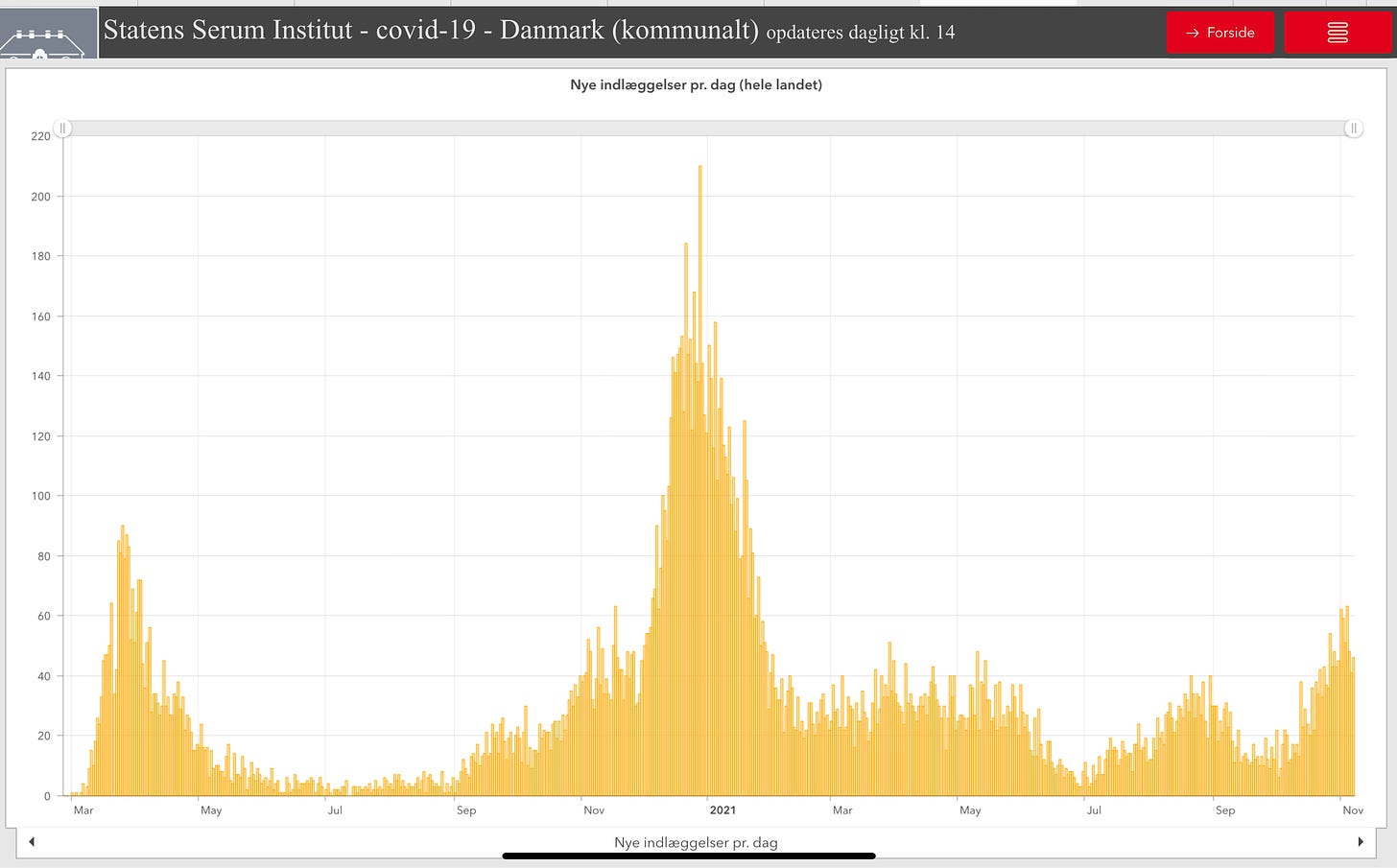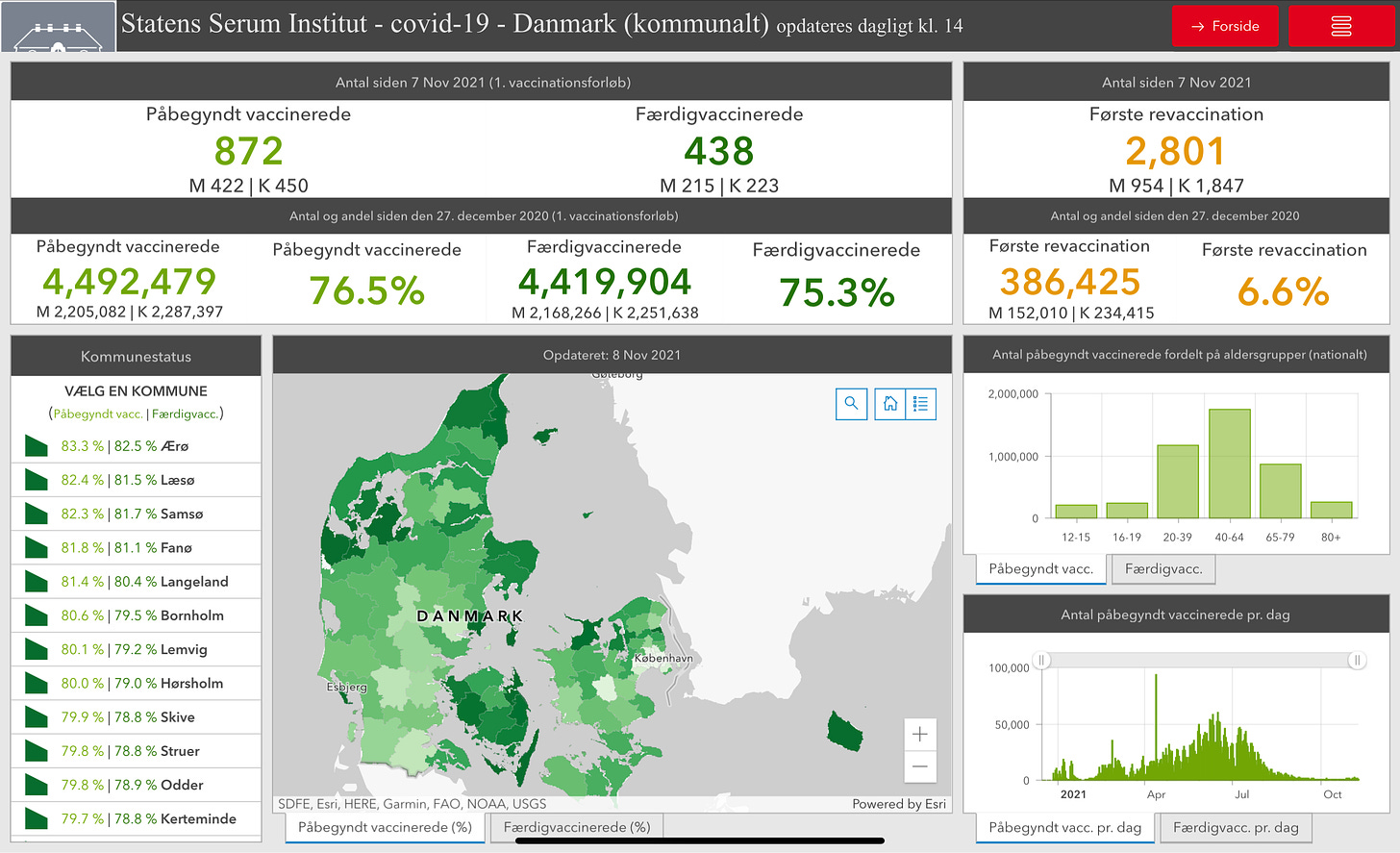Denmark’s return to normal hits a snag
The vaccine passport, coronapas, could soon make a return
The Danish government is going to restore the designation that coronavirus is a ‘socially critical disease.’ But to do so it must pass a majority vote in the Parliament’s Epidemic Commission. If it passes it will give the government a legal basis to levy a number of measures and restrictions should it choose to do so.
Denmark’s Statsminister Mette Frederiksen says the coronapas requirement will be broadly reimposed if the vote in the Parliament’s Epidemic Commission goes her way. The vote is expected to take place on Tuesday.
This appears to be as far as the Danish government is willing to go right now as infections soar and hospitalizations rise. There was no mention of face masks or, more surprisingly, any measures even hinted at to stem the infection spread among young children, despite, frankly very concerning numbers.
The number of infections by age in Denmark over the last seven days/Staten Serum Institut
Fielding questions from reporters after the press conference, the Prime Minister was asked repeatedly why Denmark is not taking a tougher stance towards people who refuse to get vaccinated.
Mette Frederiksen:
“There is a small group that is not playing by the rules during the pandemic. There is no excuse for not being vaccinated. You bear a responsibility for the whole of Danish society right now.”
When pressed she said further measures aimed at the unvaccinated were under consideration.
“We can not just look at the fact that so few ruin it for so many. So we are also considering whether to do more.”
Health Minister Magnus Heunicke says the plan is to broadly reimpose the coronapas for a wide variety of indoor spaces, events, and nightlife venues. These would include nightclubs, cafes, restaurants, party buses, and for larger events. Heunicke says a coronapas requirement would come into force for any indoor event with 200 or more attendees and any large event with 2,000 or more spectators including sporting events.
“But let me just state that this is a recommendation from the Epidemic Commission, and the government agrees.”
Mette Frederiksen says if the coronapas is reintroduced it will be designed so that the responsible majority who are vaccinated will live with as few restrictions as possible.
“It is our task to ensure that the very large majority of Danes who have been vaccinated that they can get through this winter with as few restrictions as possible. Therefore, we are also considering whether the coronapas should be used even more widely. We are not in the same situation as we were last autumn. All we are proposing now is that we want a Denmark that remains open.”
-
While the coronapas comeback has to survive a trial by politics, some companies in Denmark are charging ahead on their own. The Chief Communications Officer for the Danish Grocery store chain REMA 1000, Jonas Schrøder, said today that coronavirus cases are rising at the company’s main warehouse in Horsens. He says in order to ensure supply chain integrity and the safety of their employees, the warehouse now has a coronapas requirement. All employees must show valid fully vaccinated status, a recent infection, or negative test results.
REMA 1000 is not alone; a number of other businesses, including some restaurants in Copenhagen, have taken it on themselves to institute a coronapas requirement.
-
The return of the coronapas has the blessing of Danish Industry, a private trade group representing about 18,000 companies in Denmark.
DI Political Director Emil Fannikke Kiær spoke to Ritzau:
“Denmark absolutely must avoid new lockdowns and restrictions. The coronapas is and must be the tool for ensuring an open and well-functioning labor market and society. With the coronapas and the high number of citizens who have been vaccinated, we can avoid deeply annoying restrictions.”
However, Emil Fannikke Kiær urged the Danish government to build in a legal basis for companies to be able to demand that their employees must show their coronapas.
“Danish companies naturally want to ensure the safety and health of their employees. Therefore, for some it is a problem that there is no basis for requiring employees to have a valid corona passport. This is especially true in companies where a larger proportion of employees have not yet been vaccinated. We see examples of this, especially in the food and service industry.”
He says DI is also hopeful that vaccination rates will increase again. The industry group says it is standing by to work with the government on any vaccination initiatives.
-
The CEO of the Danish Chamber of Commerce, Brian Mikkelsen, had mixed reactions to today’s news. Mikkelsen says Dansk Erhverv is a yes on the return of the coronapas but a hard no on restoring the ‘socially critical disease’ designation to the coronavirus.
“We support the reintroduction of coronapas. But Dansk Erhverv will be sad if corona is upgraded to a socially critical disease with all the tools that come with it. We recommend instead that the Folketing (Danish Parliament) make a specific agreement on the introduction of coronapas.”
-
Coronapas aside, the Prime Minister, Health Minister, and the heads of the Danish National Health Board, and the Staten Serum Institut took repeated aim at one group, the unvaccinated.
Mette Frederiksen called the COVID situation “worrying” and laid it at the feet of the stubborn few.
“Get vaccinated. Do it for your own sake. Do it for the sake of your children. For the sake of your spouse. Get vaccinated to help the most vulnerable. There is no excuse to not get vaccinated.”
Danish National Health Board Director Søren Brostrøm says there are two groups who make up the majority of COVID hospitalizations right now. They are the unvaccinated and older people over the age of 50.
“You will live a dangerous life this winter if you are unvaccinated and an adult. Get vaccinated. Delta is not for children. It's not for adults either. There are virtually no fully vaccinated people under the age of 50 that are hospitalized.”
Brostrøm adds:
“The epidemic is developing among unvaccinated children and young people. It spills over onto parents and grandparents.”
Staten Serum Institut Director Henrik Ullum further pounded the point home by emphasizing that unvaccinated people are being hospitalized at a much higher rate than those with one vaccine dose or two. He says per 100,000 people hospitalization rates for the unvaccinated are 15.6 compared to 4.3 for those who are fully vaccinated.
Some of the municipalities with the lowest vaccination rates in Denmark are in Metro Copenhagen. Ishøj Kommune has the lowest vaccination coverage with 62.5% of its population having both doses. It is followed by Brøndby and Høje-Taastrup.
-
The blunt message to the remaining holdouts to get vaccinated seems to have reached at least some people. Ritzau is reporting that during the press conference some 11,000 people went online at vaccine.dk to book a time to get the jab.
-
Denmark’s Health Minister Magnus Heunicke took to Twitter after the press conference to underscore how bad the COVID situation is right now. He notes there has been a “significant” COVID increase, with 88 of the country’s 98 municipalities having a coronavirus incidence rate per 100,000 people of 100 or more. Heunicke says there have been 370 hospitalizations in the last week, compared to 107 just a month ago.

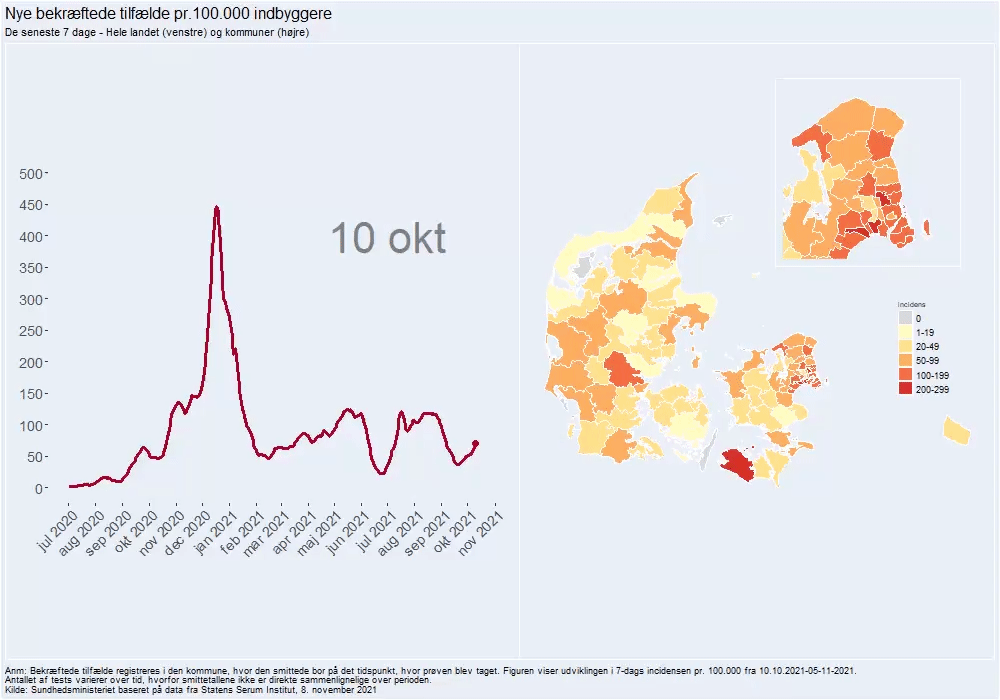
-
Today Denmark reported 2,294 COVID infections and two more coronavirus deaths.
Yesterday there were 135,571 total corona tests done, of which 101,929 were PCR tests equaling a positivity percentage of 2.25%, which is not good.
-
COVID hospitalizations (303) have jumped (+21) cracking 300 total hospitalizations for the first time since February 15. The number of infected people in an ICU (35) dropped (-4) and of those the number on a ventilator (21) also edged downward (-2).
-
On the vaccination front to date, there were just 4,111 total inoculations yesterday as 1st doses fell back below 1,000.
76.5% of the total population has one dose, 75.3% have two, and 6.6% have had a 3rd booster dose.
-
Mette Frederiksen admitted today that the speed at which Denmark’s COVID situation deteriorated happened much faster than anyone expected.
“The health authorities had expected that there would be more infections and hospitalizations, but it has gone faster than expected.”
She also pointed out that hospital admissions may continue to shoot upward.
“We must all remember that the pressure on the healthcare system is delayed. The hospitalizations and deaths we see now are the result of the infection that lies behind us.”
-
Denmark gradually wound down COVID restrictions, with the last of them being lifted on September 10 when the ‘socially critical disease’ designation was removed from the coronavirus. With it went any legal justification for imposing any measures. Now, almost two months to the day, the Danish government is looking to restore the designation and with it the power to levy restrictions.
Depending on how the vote plays out on Tuesday, a celebrated return to ‘normal life’ in Denmark could soon become a failed experiment.




